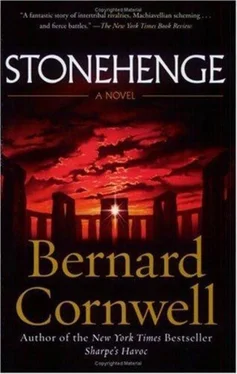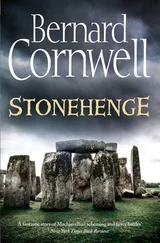The world was as it had been. The winter was as cold as ever. Snow fell. The old, the sick and the cursed died. Saban doled out grain, sent hunters to the woods and guarded the tribe's treasures. Some of the old folk said it was as though Hengall had never died, but had simply been reborn into Saban.
Yet on the hill there stood a broken circle of stone within a ring of chalk.
The bodies of Camaban, Aurenna and Lallic were laid in the Death House and there, in the shadow of the mother stone, the ravens fed on their flesh until, in the late spring, there were only white bones left on the grass. Haragg's bones had long been buried.
The temple was never deserted. Even in that first hard winter folk came to the stones. They brought their sick to be healed, their dreams to be fulfilled and gifts to keep Ratharryn wealthy. Saban was surprised, for he had thought that with Camaban's death and the capstone's fall the temple had failed. Slaol had not come to earth and winter still locked the river with ice, but the people who came to the temple believed the stones had worked a miracle. 'And so they did,' Derrewyn said to Saban in the first spring after Camaban's death.
'What miracle?' Saban asked.
Derrewyn grimaced. 'Your brother believed the stones would control the gods. He thought he was a god himself, and that Aurenna was a goddess, and what happened?'
'They died,' Saban said curtly.
'The stones killed them,' Derrewyn said. 'The gods did come to the temple that night and they killed the man who claimed he was a god and crushed the woman who thought she was a goddess.' She stared at the temple. 'It is a place of the gods, Saban. Truly.'
'They killed my daughter too,' Saban said bitterly.
'The gods demand sacrifice.' Derrewyn's voice was harsh. 'They always have. They always will.'
Aurenna and Lallic were laid in a shared grave and Saban raised a mound over them. He made another mound forCamaban, and it was that second grave that had brought Derrewyn to Ratharryn. She watched as Camaban's bones were laid in the mound's central pit. 'You won't take his jawbone?' she asked Saban.
'Let him talk to the gods as he always did.' Saban put the small mace beside his brother's body, then added the gold-hiked knife, the copper knife, the great buckle of gold and, last of all, a bronze axe. 'In the afterlife,' Saban explained, 'he can work. He always boasted he never held an axe, so let him hold one now. He can fell trees, as I did.'
'And he will go to Lahanna's care after all,' Derrewyn said with a toothless smile.
'It seems so,' Saban said.
'Then he can take her a gift from me.' Derrewyn climbed down into the pit and placed the three lozenges on Camaban's breast. She placed the large one in the centre and the two smaller on either side. A robin perched on the edge of the pit and Saban took the bird's presence as a sign that the gods approved of the gift.
Saban helped Derrewyn climb from the grave. He stared a last time at his brother's bones, then turned away. 'Fill it,' he ordered the waiting men, and so they scraped the earth and chalk onto Camaban's body, finishing the mound that would stand with the other ancestors' graves on the grassy crest above the temple.
Saban walked home.
It was evening, and the shadow of the stones stretched long towards Ratharryn. They stood grey and gaunt, broken and awesome, like nothing else on all the earth, but Saban did not look back. He knew he had built a great thing and that folk would worship there until time itself was ended, but he did not look back. He took Derrewyn's arm and they walked away until they were free of the temple's shadow.
There were fish traps to mend and ground to break and grain to sow and disputes to settle.
Behind Saban and Derrewyn the dying sun flashed in the temple's topmost arch. It blazed there for a while, edging the stones with dazzling light, and then it sank and in the twilight the temple turned as black as night. Day folded into darkness and the stones were left to the spirits.
Which hold them still.
Historical Note
It is surely obvious that every character and deity in the novel is fictitious. The Stonehenge that we see is the ruin of a monument that was erected at the end of the third millennium BC, the beginning of Britain's Bronze Age, and we have no records of kings, chiefs, cooks or carpenters from that era. Nevertheless, some of the detail in the novel is drawn from the archaeological records. There was an archer, with a stone bracer to protect his wrist from the lash of his bow, buried beside Stonehenge's north-eastern entrance, and he had been killed, evidently at close quarters, by three arrows. The three gold lozenges, the belt buckle, the knives, axe and ceremonial mace were discovered in one of the burial mounds closest to the monument and are today on display in the Devizes Museum. Ratharryn is what we now call Durrington Walls and its vast embankment was one of the great feats of neolithic man, though today it is little more than a shadow on the ground. There were probably two temples within the embankment and a third, which is now called Woodhenge, just outside, and all of those shrines were close to Stonehenge which is here called the Old Temple or the Sky Temple. Cathallo is Avebury, the long barrow where Camaban's warriors defiled the bones is at West Kennet, the small temple at the end of the sacred avenue is the Sanctuary and the Sacred Mound, of course, is Silbury Hill, and all those features can still be visited. Drewenna is Stanton Drew, Maden is Marden, Sarmennyn is southwest Wales. At Stonehenge itself the 'moonstones' are now called the Station Stones, while the 'sun stone' is the Heel Stone. The word 'henge' is deliberately not used in the novel, for it would have had no meaning. The Saxons originally applied the word only to Stonehenge, for only Stonehenge had 'hanging' (henge) stones (i.e. the lintels), but over the years we have broadened its meaning to include any and every circular monument that remains from the neolithic and early bronze ages.
What is Stonehenge? It is the question that occurs to most visitors and little at the site provides any answer other than the one propounded by R. J. C. Atkinson in his impressive book Stonehenge. 'There is one short, simple and perfectly correct answer: we do not know, and we shall probably never know.' Which is rather dispiriting, for without some idea of their use and purpose, the stones are diminished. We can appreciate the immense labour involved in the transport and erection of the monument, we can marvel that such a thing was built at all, but without a glimpse into the minds of the builders, it is somewhat meaningless.
It is, plainly, a place of worship, but worship of what? The usual answer is that the temple of Stonehenge is aligned on the rising of the midsummer sun, and that belief has led to much nonsensical misuse of the monument. The revived Order of Druids likes to worship there each midsummer, even though Stonehenge had nothing whatever to do with the Druids, who flourished long after the monument had decayed and who, in any case, probably preferred their rites to take place in dark, forested shrines. Undoubtedly there is an alignment on the midsummer sunrise, but it is not the only alignment at Stonehenge. John North, in his challenging book Stonehenge, Neolithic Man and the Cosmos, makes an overwhelming case for the alignment on the midwinter sunset, and it so happens that at Stonehenge the midsummer sun rises above the north-eastern horizon almost diametrically opposite the place on the south-western skyline where the midwinter sun sets (in 2000 BC the difference between the two alignments was less than half a degree), so any monument aligned on the one will, fortuitously, mark the other and, as both events are plainly important in the annual cycle of the seasons, we can suspect that both were marked by appropriate rites.
Читать дальше
Конец ознакомительного отрывка
Купить книгу












